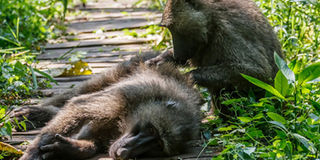Prime
Bigodi wetland: More than just a swamp

Baboons rest on the walkway in Bigodi. Courtsey photo
“Welcome to Fort Portal,” the guide, also our driver, James, said as we pulled over at Gardens Restaurant opposite Mpanga Central Market in Fort Portal Town. We had just crossed the Mpanga River which is the main source of water for the clean, refreshing and beautiful town in Tooro Kingdom.
We were about 35 minutes away from our final destination; Bigodi Wetland Sanctuary located on the edge of the lush, forested outskirts of Kibale National Park. From Fort Portal the journey along Kamwenge Road takes you through the picturesque landscape of western Uganda that is bound to slow you down as you take time to capture every step of journey. Widespread tea plantations and crater lakes reflect the wealth and diversity of Tooro’s scenic beauty.
Congresses of baboons along the road are evidence of the primate haven that is Kibale Forest.
We could not proceed without checking on human being’s closest cousins from the wild so the following day we only proceeded with our journey after a bit of chimpanzee tracking in Kibale Forest.
Bigodi Wetland Sanctuary and Magombe swamp are attractions managed by Kibale Association for Rural Development (KAFRED), a community-based organisation that supports eco-tourism initiatives with the objective of helping communities benefit from tourism.
This was evident on arrival as we were greeted by women making beads from recycled paper and crafts from banana fibre, raffia and palm leaves from the nearby swamps. These environmentally friendly products, we were later told, are sold to tourists or exported. The women’s group chair, Betty Tinka, proudly informed us that 10 per cent of the sales are invested in community development.
Adding that for some time now, the sales have funded Bigodi Nursery school, an achievement that has led the women to appreciate the role of tourism in community development.
I curiously asked a sanctuary guide the meaning of Bigodi. The question brought a smile to his face as he narrated that the name was derived from the word ‘kugodya’, a Rutooro word to mean ‘walk in a tired way’.
“The story is that whenever visitors reached this place, they appeared exhausted and could not walk any further. They always rested here,” he explained.
Hub of nature
In this kind of setting you may find yourself looking out for monstrous creatures. Incidentally the most eminent danger is from red ants which can only be stopped by wearing closed shoes and tucking trousers into socks.
We walked through a swamp along a trail with boardwalks. During the walk, we were informed of the sanctuary’s large number of butterflies and primates that include the black and white colobus, mangabey, L’Hoest’s and red-tailed monkeys. They are regularly joined by chimpanzees that cross over from the adjacent Kibale Forest National Park.
The sanctuary is gifted with a vast, predominantly rich papyrus, vegetation with thousands of tree species that are home to a wide range of wildlife species that continue to surprise you along the way.
Out of more than 200 bird species in the wetland, it is the great blue turaco that had the most intriguing story. The colourful bird is known to be such a loyal lover that when it loses a partner it remains single for life.
After our three-hour walk, we were treated to ‘real burritos’ with homemade tortillas at the ECO BURRITTO. The tortillas, filled with rice, beans, eggplants, onions, avocado sprinkled with chilli pepper wrapped in a closed-ended cylinder are just what we needed after the trek.
Opening doors
This is also more evidence of opportunities created by KAFRED’s efforts. Izidol Arinaitwe, who served us the sumptuous burritos, says tourist revenue collection was used to build Bigodi Secondary School and part of the annual collection still pays salaries for the teachers. The visits organised for tourists have created a positive relationship between tourists and the host community. Some children have even secured sponsorship for their studies.
According to Odomaro Akampulira, the KAFRED assistant programme manager, the good work has not gone unnoticed.
“We are the 2015 Silver Winner of African Responsible Tourism Award, the only Ugandan destination to be honoured; our affiliated Tinka’s Homestead won the UTB award for Best Homestay 2017 and recently in March we won the TO-DO! Eco-Tourism Competition in Germany,” he explains with a beaming smile.
KAFRED, a member of the Uganda Community Tourism Association (UCOTA) was established in 1992 by John Tinka with the aim of protecting the areas of rich biodiversity outside nationally protected areas such as Kibale National Park. Currently, the community-based organisation has more than 150 members who include members from Enyange Dramactors, Bigodi Women’s Group and Kiyoima Women’s group.
If you go
A Bigodi swamp walk costs Shs10,000 for Ugandans and $23 (about Shs82,000) for foreign tourists. Foreign residents are expected to part with Shs40,000. The best times are between 7:30am-9am in the morning or 3pm. KAFRED operates Tinka’s Homestay that serves traditional meals and offers decent accommodation. A room costs Shs70,000 and a meal Shs15,000. For visitors interested in a community walk, Ugandans part with Shs10,000, foreign tourists pay $20 (about Shs71,000), whereas foreign residents are charged $15 (about Shs53,000).




